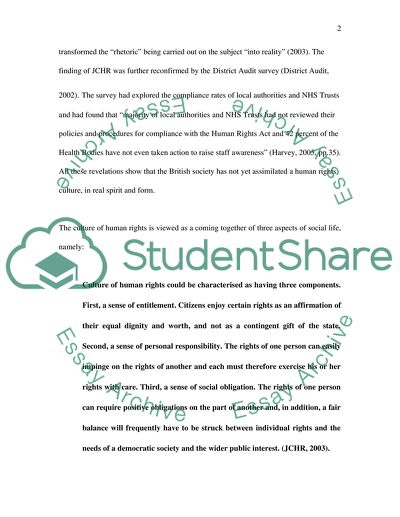Cite this document
(Towards a Human Rights Culture Assignment Example | Topics and Well Written Essays - 4750 words, n.d.)
Towards a Human Rights Culture Assignment Example | Topics and Well Written Essays - 4750 words. Retrieved from https://studentshare.org/law/1743578-the-human-rights-act-1998-was-heralded-as-a-measure-that-would-help-to-inaugurate-a-gradual-transformation-of-civil-society-not-simply-make-a-technical-adjustment-to-the-statute-book-it-was-hoped-that-it-would-not-only-create-domestic-legal-remedies-fo
Towards a Human Rights Culture Assignment Example | Topics and Well Written Essays - 4750 words. Retrieved from https://studentshare.org/law/1743578-the-human-rights-act-1998-was-heralded-as-a-measure-that-would-help-to-inaugurate-a-gradual-transformation-of-civil-society-not-simply-make-a-technical-adjustment-to-the-statute-book-it-was-hoped-that-it-would-not-only-create-domestic-legal-remedies-fo
(Towards a Human Rights Culture Assignment Example | Topics and Well Written Essays - 4750 Words)
Towards a Human Rights Culture Assignment Example | Topics and Well Written Essays - 4750 Words. https://studentshare.org/law/1743578-the-human-rights-act-1998-was-heralded-as-a-measure-that-would-help-to-inaugurate-a-gradual-transformation-of-civil-society-not-simply-make-a-technical-adjustment-to-the-statute-book-it-was-hoped-that-it-would-not-only-create-domestic-legal-remedies-fo.
Towards a Human Rights Culture Assignment Example | Topics and Well Written Essays - 4750 Words. https://studentshare.org/law/1743578-the-human-rights-act-1998-was-heralded-as-a-measure-that-would-help-to-inaugurate-a-gradual-transformation-of-civil-society-not-simply-make-a-technical-adjustment-to-the-statute-book-it-was-hoped-that-it-would-not-only-create-domestic-legal-remedies-fo.
“Towards a Human Rights Culture Assignment Example | Topics and Well Written Essays - 4750 Words”, n.d. https://studentshare.org/law/1743578-the-human-rights-act-1998-was-heralded-as-a-measure-that-would-help-to-inaugurate-a-gradual-transformation-of-civil-society-not-simply-make-a-technical-adjustment-to-the-statute-book-it-was-hoped-that-it-would-not-only-create-domestic-legal-remedies-fo.


